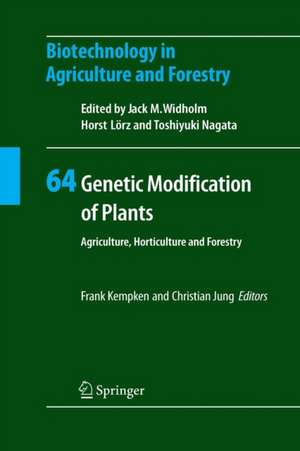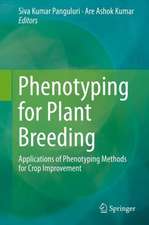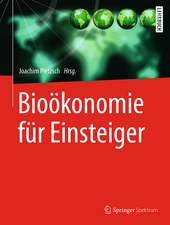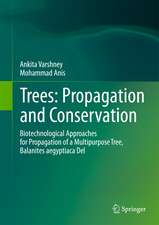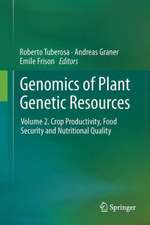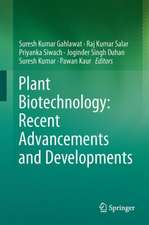Genetic Modification of Plants: Agriculture, Horticulture and Forestry: Biotechnology in Agriculture and Forestry, cartea 64
Editat de Frank Kempken, Christian Jungen Limba Engleză Paperback – 23 aug 2016
| Toate formatele și edițiile | Preț | Express |
|---|---|---|
| Paperback (1) | 1835.07 lei 6-8 săpt. | |
| Springer Berlin, Heidelberg – 23 aug 2016 | 1835.07 lei 6-8 săpt. | |
| Hardback (1) | 1836.82 lei 6-8 săpt. | |
| Springer Berlin, Heidelberg – 4 feb 2010 | 1836.82 lei 6-8 săpt. |
Din seria Biotechnology in Agriculture and Forestry
- 15%
 Preț: 655.60 lei
Preț: 655.60 lei - 18%
 Preț: 968.65 lei
Preț: 968.65 lei - 18%
 Preț: 1841.68 lei
Preț: 1841.68 lei - 18%
 Preț: 1843.11 lei
Preț: 1843.11 lei - 18%
 Preț: 1841.99 lei
Preț: 1841.99 lei - 18%
 Preț: 966.78 lei
Preț: 966.78 lei - 18%
 Preț: 958.73 lei
Preț: 958.73 lei - 18%
 Preț: 1832.39 lei
Preț: 1832.39 lei - 15%
 Preț: 658.22 lei
Preț: 658.22 lei - 18%
 Preț: 959.19 lei
Preț: 959.19 lei - 18%
 Preț: 1837.45 lei
Preț: 1837.45 lei - 18%
 Preț: 1837.88 lei
Preț: 1837.88 lei - 18%
 Preț: 961.41 lei
Preț: 961.41 lei - 15%
 Preț: 651.99 lei
Preț: 651.99 lei - 15%
 Preț: 645.79 lei
Preț: 645.79 lei - 15%
 Preț: 649.06 lei
Preț: 649.06 lei - 18%
 Preț: 1831.12 lei
Preț: 1831.12 lei - 18%
 Preț: 1839.50 lei
Preț: 1839.50 lei - 18%
 Preț: 1829.05 lei
Preț: 1829.05 lei - 18%
 Preț: 1834.77 lei
Preț: 1834.77 lei - 15%
 Preț: 650.19 lei
Preț: 650.19 lei - 18%
 Preț: 1828.74 lei
Preț: 1828.74 lei - 15%
 Preț: 668.04 lei
Preț: 668.04 lei - 18%
 Preț: 1831.60 lei
Preț: 1831.60 lei - 15%
 Preț: 648.89 lei
Preț: 648.89 lei - 18%
 Preț: 1833.48 lei
Preț: 1833.48 lei - 18%
 Preț: 1831.73 lei
Preț: 1831.73 lei - 18%
 Preț: 1824.01 lei
Preț: 1824.01 lei - 18%
 Preț: 1829.36 lei
Preț: 1829.36 lei - 15%
 Preț: 644.82 lei
Preț: 644.82 lei - 18%
 Preț: 1828.60 lei
Preț: 1828.60 lei - 18%
 Preț: 1224.54 lei
Preț: 1224.54 lei
Preț: 1835.07 lei
Preț vechi: 2237.90 lei
-18% Nou
Puncte Express: 2753
Preț estimativ în valută:
351.19€ • 362.30$ • 297.23£
351.19€ • 362.30$ • 297.23£
Carte tipărită la comandă
Livrare economică 04-18 martie
Preluare comenzi: 021 569.72.76
Specificații
ISBN-13: 9783662518731
ISBN-10: 3662518732
Pagini: 675
Ilustrații: XXVII, 675 p.
Dimensiuni: 155 x 235 mm
Greutate: 0.97 kg
Ediția:Softcover reprint of the original 1st ed. 2010
Editura: Springer Berlin, Heidelberg
Colecția Springer
Seria Biotechnology in Agriculture and Forestry
Locul publicării:Berlin, Heidelberg, Germany
ISBN-10: 3662518732
Pagini: 675
Ilustrații: XXVII, 675 p.
Dimensiuni: 155 x 235 mm
Greutate: 0.97 kg
Ediția:Softcover reprint of the original 1st ed. 2010
Editura: Springer Berlin, Heidelberg
Colecția Springer
Seria Biotechnology in Agriculture and Forestry
Locul publicării:Berlin, Heidelberg, Germany
Cuprins
Generation and Analysis of Transgenic Plants.- Plant Nuclear Transformation.- Plastid Transformation.- Concepts of Marker Genes for Plants.- Precise Breeding Through All-Native DNA Transformation.- Gene Silencing in Plants: Transgenes as Targets and Effectors.- Breeding with Genetically Modified Plants.- Detection of Genetically Modified Plants in Seeds, Food and Feed.- Selected Characters of Transgenic Plants and Their Application in Plant Production.- Drought Stress Tolerance.- Herbicide Resistance.- Insect and Nematode Resistance.- Metabolic Engineering.- Pharmaceuticals.- Biopolymers.- Engineered Male Sterility.- Transgenic Plants in Breeding and Crop Production.- Cotton.- Triticeae Cereals.- Fruit Crops.- Maize.- Ornamentals.- Potato.- Rapeseed/Canola.- Rice.- Sugarcane.- Soybean.- Vegetables.- Risk Assessment and Economic Applications.- Regulatory Oversight and Safety Assessment of Plants with Novel Traits.- Environmental Impact of Genetically Modified Maize Expressing Cry1 Proteins.- Benefits of Transgenic Plants: A Socioeconomic Perspective.- Risk Assessment and Economic Applications – the Cartagena Protocol on Biosafety: GMO Approval and Import on a World-Wide Scale.- Public Perceptions of Modern Biotechnology and the Necessity to Improve Communication.
Textul de pe ultima copertă
Today´s agriculture faces new and difficult challenges. With modern methods widely applied, it is commonly believed that genetic crop improvement is a key for increasing yields. In spite of the discussion about the safety of genetically modified (GM) crops that is still raging in the European Union where the take-up of the new technology is more limited, the cultivation of GM plants and crops has exploded all over the world.
Conceived with the aim of sorting fact from fiction over GM crops, this volume brings together the knowledge of 30 specialists in the field of transgenic plants. It covers the generation and detection of these plants as well as the genetic traits conferred on transgenic plants. In addition, the book looks at a wide variety of crops, ornamental plants and tree species that are subject to genetic modifications, assessing the risks involved in genetic modification as well as the potential economic benefits of the technology in specific cases. The book’s structure, with fully cross-referenced chapters, gives readers a quick access to specific topics, whether that is detailed and comprehensive data on particular species of ornamentals, or coverage of the socioeconomic implications of GM technology. With an increasing demand for bioenergy, and the necessary higher yields relying on wider genetic variation, this book supplies all the technical details required to move forward to a new era in agriculture.
Conceived with the aim of sorting fact from fiction over GM crops, this volume brings together the knowledge of 30 specialists in the field of transgenic plants. It covers the generation and detection of these plants as well as the genetic traits conferred on transgenic plants. In addition, the book looks at a wide variety of crops, ornamental plants and tree species that are subject to genetic modifications, assessing the risks involved in genetic modification as well as the potential economic benefits of the technology in specific cases. The book’s structure, with fully cross-referenced chapters, gives readers a quick access to specific topics, whether that is detailed and comprehensive data on particular species of ornamentals, or coverage of the socioeconomic implications of GM technology. With an increasing demand for bioenergy, and the necessary higher yields relying on wider genetic variation, this book supplies all the technical details required to move forward to a new era in agriculture.
Caracteristici
Covers all aspects of transgenic plants including possible applications and risk assessment Includes supplementary material: sn.pub/extras
